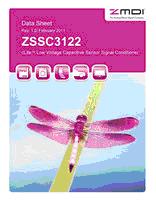Mar 4 2011
ZMD has added the ZSSC3122 cLite device to its existing line of capacitive sensor signal conditioners. The chip features 14-bit resolution and 0.25% full-scale-output accuracy.
 ZMD 's ZSSC3122 cLite
ZMD 's ZSSC3122 cLite
An integrated sleep mode helps reduce current consumption to less than 1uA for up to 85°C, making it suitable for use in energy efficient battery applications, besides industrial and harsh conditions. Other applications include MEMS sensing devices like pressure sensors for use in hydraulic control systems, humidity sensors and liquid level meters. The device operates at 60uA over a voltage range of 1.8V to 5.5V.
The device can be connected to an interface from 2 to 10pF with a low sensitivity of 125aF per digital bit. The component features multiple input sensor measurements. All calibrations are digital. It does not need expensive laser trimming. Although, it is connected to micro-controllers, it can also be incorporated into stand-alone transducer and switch applications.
The supply voltage is 1.8 to 5.5V with precision of 0.25 % over -40°C to +125°C. The capacitive sensor can be pre-set and calibrated. The device is available via a standard PC using the accompanying development kit. The kit also features the TSSOP 14, a development board, USB cable and software to enable calibration.
Source: http://www.zmdi.com/